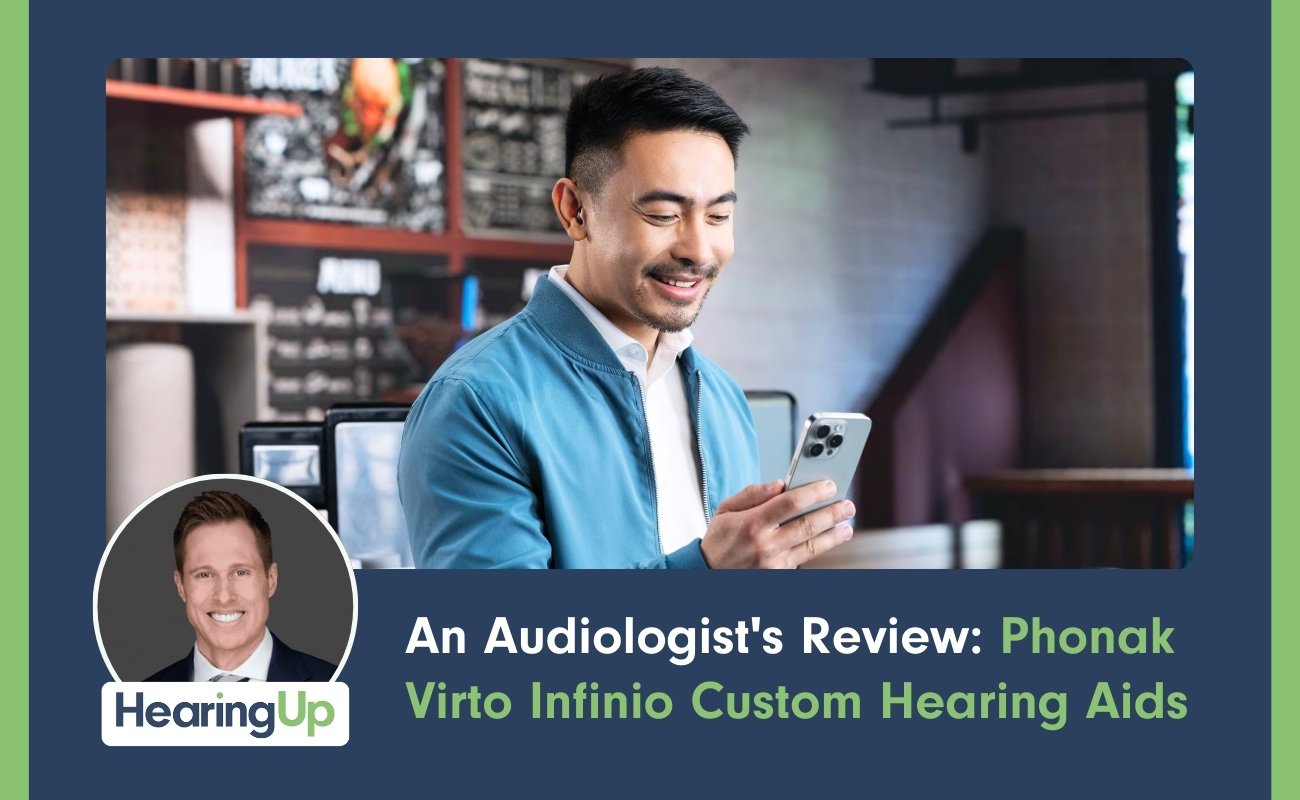Hi guys. Rachel Cook, Doctor of Audiology at Applied Hearing Solutions in Phoenix, Arizona, and in this video I'm going to review the four key differences between OTC hearing aids and prescription hearing aids.
It's been a long road for hearing aids since the OTC Act was signed into law back in 2017 by then President Donald Trump. Finally, five years later, on August 17th, 2022, the FDA released their 200 page final guidelines establishing new categories of OTC hearing aids and prescription hearing aids. Now that an OTC hearing aid category exists, you might be asking yourself what makes an OTC hearing aid different from a prescription hearing aid? That is why today I'll be discussing the four key differences between OTC hearing aids and prescription hearing aids so that you can make an informed decision about which one is right for you. But before I do that, I would really appreciate if you could hit that like button to bring these videos to a broader audience. And while you're at it, if you haven't already, hit that subscribe button with notification bell, go ahead and do that as well so that you never miss any of our newly released videos.
That being said, I really appreciate it. Now let's jump into our first key difference between OTC hearing aids and prescription hearing aids, which is who these different devices are designed for. The intended user of an OTC hearing aid is described by the FDA as individuals over the age of 18 with perceived mild to moderate hearing loss. OTC hearing aids also warn of several red flag conditions that disqualify a consumer from using them, such as active pain or drainage from the ears, tinnitus in asymmetrical hearing loss, or a sudden change in hearing tinnitus or vertigo. Prescription hearing aids are intended for users of all ages with all types and severities of hearing losses, along with the assistance of a professional like an audiologist or a hearing instrument specialist. If you are someone who understands technology has a perceived mild to moderate hearing loss and does not have any of the ear related medical conditions, then OTC is an option for you.
However, if you are not tech savvy, have more than a mild hearing difficulty or have one of the FDA red flag conditions, then you will still need to see a hearing healthcare professional. The second key difference between OTC hearing aids and prescription hearing aids is accessibility. OTC hearing aids are intended to be more accessible to the general public by removing the involvement of a hearing healthcare professional and by making them available online and through other retail establishments. This new legislation defines design function and safety requirements to allow these products to be available over the counter like medications and health devices that you can purchase today without barriers to access. This allows OTC products to end up in the hands of consumers who may live in rural areas with limited access to healthcare professionals who may not have the finances to obtain prescription level hearing aids or who may have a mild hearing impairment and feel comfortable setting up and learning how to use their own devices.
Alternatively, prescription level hearing aids are considered medical devices by the fda, and as such, have a high level of mandatory regulations to ensure safety and effectiveness. Because prescription hearing aids are intended to treat a wide variety of hearing losses with a varying degree of complexity, it requires additional expertise to ensure that the hearing loss is being treated appropriately by a hearing care professional. This need for a specific device and in-office, professional assistance make prescription hearing aids less accessible even with the proliferation of remote care services, allowing for some at-home follow-up care. This brings me to the third key difference between OTC hearing aids and prescription hearing aids, which is affordability. Now, it's no surprise that if you remove a hearing care professional from the hearing aid delivery model, that this would reduce the cost of an OTC hearing aid. Prescription hearing aid manufacturers spend hundreds of millions of dollars on research and development and require a hearing care professional for programming verification and validation and for ongoing long-term audiologic support.
While compliance with these new FDA guidelines will make OTC hearing aids more costly to manufacture and sell initially, they will still cost less to manufacturer than prescription hearing aids. OTC manufacturers also will not incur the additional costs associated with providing ongoing support. Most OTC hearing aids are expected to range between a few hundred dollars and a few thousand dollars, and it'll depend on the technology capabilities that they contain and their build quality. There will still be some prescription hearing aids fit with professional assistance that will be at or below the price point of over the counter hearing aids. However, overall OTC hearing aids are anticipated to cost less and therefore be more affordable. The fourth and final key difference between OTC hearing aids and prescription hearing aids is the level of consumer support. Individuals who obtain an OTC hearing aid will now be responsible for selecting the brand, the style and acoustic coupling of the hearing aid, as well as self fitting the hearing aid through the use of their smart device.
They will also be responsible for familiarizing themselves with the devices, including insertion and removal of the hearing aid care, maintenance of the devices, and all associated troubleshooting. While the FDA is finalizing the ruling regarding returns and refunds, they did not include any requirements about the ongoing support of the devices themselves. Meaning some companies may not have ways to assist consumers who purchase the product and are struggling with using it when pursuing the prescriptive route. The primary role of a hearing care professional is to identify the hearing loss, prescribe the appropriate hearing aids, fit the hearing aids to your hearing loss prescription, and provide ongoing in-person support. These appointments allow professionals who follow best practices to verify and validate your performance with the hearing aids to ensure you're obtaining the maximum amount of benefit from your devices. Adjusting to amplification can be difficult for some first time hearing aid users and hearing healthcare professionals can help provide guidance through this process.
Also, there's generally a structured follow up schedule put in place as well to perform repairs and preventative maintenance of the devices to ensure the devices are mechanically functioning properly and to monitor your hearing loss over time, making any necessary changes to hearing aid programming. While more differences between OTC hearing aids and prescription hearing aids will become more apparent over time, these four key differences will be very apparent right from the start. If you do elect to go the OTC route, just remember that performance may vary, and if you're not getting the benefit that you expected from your OTC hearing aid, reach out to your local audiology clinic for additional assistance because they would be happy to help you with your OTC devices. If you elect to go the prescriptive route, just make sure you find a professional that follows best practices, and if you don't know what best practices are, I recommend you check out our video that I will link in the description. Overall, it was about time that the FDA released these final guidelines. Now we just have to wait and see what these OTC hearing aids are capable of. That's it for this video. If you have any questions, please be sure to drop 'em in the comments below. And if you liked this video, please give it a thumbs up and subscribe for more videos just like this one.
Further reading:
Hi guys. Rachel Cook, Doctor of Audiology at Applied Hearing Solutions in Phoenix, Arizona, and in this video I'm going to review the four key differences between OTC hearing aids and prescription hearing aids.
It's been a long road for hearing aids since the OTC Act was signed into law back in 2017 by then President Donald Trump. Finally, five years later, on August 17th, 2022, the FDA released their 200 page final guidelines establishing new categories of OTC hearing aids and prescription hearing aids. Now that an OTC hearing aid category exists, you might be asking yourself what makes an OTC hearing aid different from a prescription hearing aid? That is why today I'll be discussing the four key differences between OTC hearing aids and prescription hearing aids so that you can make an informed decision about which one is right for you. But before I do that, I would really appreciate if you could hit that like button to bring these videos to a broader audience. And while you're at it, if you haven't already, hit that subscribe button with notification bell, go ahead and do that as well so that you never miss any of our newly released videos.
That being said, I really appreciate it. Now let's jump into our first key difference between OTC hearing aids and prescription hearing aids, which is who these different devices are designed for. The intended user of an OTC hearing aid is described by the FDA as individuals over the age of 18 with perceived mild to moderate hearing loss. OTC hearing aids also warn of several red flag conditions that disqualify a consumer from using them, such as active pain or drainage from the ears, tinnitus in asymmetrical hearing loss, or a sudden change in hearing tinnitus or vertigo. Prescription hearing aids are intended for users of all ages with all types and severities of hearing losses, along with the assistance of a professional like an audiologist or a hearing instrument specialist. If you are someone who understands technology has a perceived mild to moderate hearing loss and does not have any of the ear related medical conditions, then OTC is an option for you.
However, if you are not tech savvy, have more than a mild hearing difficulty or have one of the FDA red flag conditions, then you will still need to see a hearing healthcare professional. The second key difference between OTC hearing aids and prescription hearing aids is accessibility. OTC hearing aids are intended to be more accessible to the general public by removing the involvement of a hearing healthcare professional and by making them available online and through other retail establishments. This new legislation defines design function and safety requirements to allow these products to be available over the counter like medications and health devices that you can purchase today without barriers to access. This allows OTC products to end up in the hands of consumers who may live in rural areas with limited access to healthcare professionals who may not have the finances to obtain prescription level hearing aids or who may have a mild hearing impairment and feel comfortable setting up and learning how to use their own devices.
Alternatively, prescription level hearing aids are considered medical devices by the fda, and as such, have a high level of mandatory regulations to ensure safety and effectiveness. Because prescription hearing aids are intended to treat a wide variety of hearing losses with a varying degree of complexity, it requires additional expertise to ensure that the hearing loss is being treated appropriately by a hearing care professional. This need for a specific device and in-office, professional assistance make prescription hearing aids less accessible even with the proliferation of remote care services, allowing for some at-home follow-up care. This brings me to the third key difference between OTC hearing aids and prescription hearing aids, which is affordability. Now, it's no surprise that if you remove a hearing care professional from the hearing aid delivery model, that this would reduce the cost of an OTC hearing aid. Prescription hearing aid manufacturers spend hundreds of millions of dollars on research and development and require a hearing care professional for programming verification and validation and for ongoing long-term audiologic support.
While compliance with these new FDA guidelines will make OTC hearing aids more costly to manufacture and sell initially, they will still cost less to manufacturer than prescription hearing aids. OTC manufacturers also will not incur the additional costs associated with providing ongoing support. Most OTC hearing aids are expected to range between a few hundred dollars and a few thousand dollars, and it'll depend on the technology capabilities that they contain and their build quality. There will still be some prescription hearing aids fit with professional assistance that will be at or below the price point of over the counter hearing aids. However, overall OTC hearing aids are anticipated to cost less and therefore be more affordable. The fourth and final key difference between OTC hearing aids and prescription hearing aids is the level of consumer support. Individuals who obtain an OTC hearing aid will now be responsible for selecting the brand, the style and acoustic coupling of the hearing aid, as well as self fitting the hearing aid through the use of their smart device.
They will also be responsible for familiarizing themselves with the devices, including insertion and removal of the hearing aid care, maintenance of the devices, and all associated troubleshooting. While the FDA is finalizing the ruling regarding returns and refunds, they did not include any requirements about the ongoing support of the devices themselves. Meaning some companies may not have ways to assist consumers who purchase the product and are struggling with using it when pursuing the prescriptive route. The primary role of a hearing care professional is to identify the hearing loss, prescribe the appropriate hearing aids, fit the hearing aids to your hearing loss prescription, and provide ongoing in-person support. These appointments allow professionals who follow best practices to verify and validate your performance with the hearing aids to ensure you're obtaining the maximum amount of benefit from your devices. Adjusting to amplification can be difficult for some first time hearing aid users and hearing healthcare professionals can help provide guidance through this process.
Also, there's generally a structured follow up schedule put in place as well to perform repairs and preventative maintenance of the devices to ensure the devices are mechanically functioning properly and to monitor your hearing loss over time, making any necessary changes to hearing aid programming. While more differences between OTC hearing aids and prescription hearing aids will become more apparent over time, these four key differences will be very apparent right from the start. If you do elect to go the OTC route, just remember that performance may vary, and if you're not getting the benefit that you expected from your OTC hearing aid, reach out to your local audiology clinic for additional assistance because they would be happy to help you with your OTC devices. If you elect to go the prescriptive route, just make sure you find a professional that follows best practices, and if you don't know what best practices are, I recommend you check out our video that I will link in the description. Overall, it was about time that the FDA released these final guidelines. Now we just have to wait and see what these OTC hearing aids are capable of. That's it for this video. If you have any questions, please be sure to drop 'em in the comments below. And if you liked this video, please give it a thumbs up and subscribe for more videos just like this one.
Further reading:

AirPods Pro 3 with iOS 18.1+ offer clinical-grade hearing aid features for mild-moderate loss, including built-in testing, custom amplification, and audiogram uploads.
Read More
Phonak Virto Infinio custom aids offer comfort and discretion but face limits in complex listening versus behind-the-ear models.
Read More
Hearing aid costs cover technology, expert services like Real Ear Measurement and fitting, ongoing support, and admin fees—justifying the investment.
Read MoreDr. Cliff reviews the Oticon OWN SI custom hearing aids, examining their invisible design, Deep Neural Network 2.0 technology, and performance trade-offs.
Read More
Dr. Cliff reviews the Widex Allure hearing aids, examining their minimalist design approach, new W1 chip technology, and notable feature reductions.
Read More
Dr. Cliff reviews the innovative Nuance Audio eyeglass hearing aids, examining their unique design, performance capabilities, and suitability for mild hearing loss.
Read More